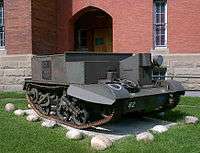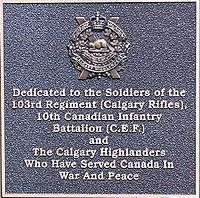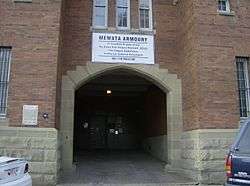Mewata Armouries
| Mewata Armoury | |
|---|---|
|
Armoury entrance | |
| Location | 801 11th Street S.W., Calgary, Southern Alberta, Alberta, Canada |
| Built | 1915–18 |
| Architect | Thomas Fuller, Dominion Architect |
| Website | Mewata Armouries |
Mewata Armoury (also referred to as Mewata Armouries) is a Canadian Forces reserve armoury in Calgary, Alberta.
The building was built between 1915 and 1918 for an original cost of $282,051 Canadian dollars. The building was designed by Thomas W. Fuller (Department of Public Works Architect) and the project was supervised locally by Calgary architect Leo Dowler. The structure was actually built by A.G. Creelman Co. of Vancouver.
The building is located at 801 11th Street S.W. and is still home to local Militia units, chiefly The King's Own Calgary Regiment and The Calgary Highlanders.
Construction materials
The building has a cut stone foundation with a structure of red brick (common bond with steel reinforcement) and sandstone. The drill hall is significant for the large uninterrupted span of its steel trusses. A second story on the west side was added some time after original construction.
Architectural style
The building was designed in a Tudor/Gothic Revival style. A classic example of armoury design, Mewata has features deliberately bringing to mind a medieval fortress or castle, including four square corner towers, four smaller six sided towers, and buttresses with turrets and a crenellated roofline.
Original interior details
The original design featured a large central drill hall with 117 rooms (two storeys of soldiers quarters) arranged around its perimeter. The basement included bowling alleys and 30 yard shooting ranges. The facility also included officers' and sergeants' billiard rooms. Barracks have been altered in recent years to serve as offices and storage space. A catwalk around the drill hall has been enclosed on the north and south sides, as well as part of the east side, leaving a short "balcony" overlooking the parade square.
Plaque
The Historic Sites and Monuments Board of Canada plaque at the Mewata Armouries states The seale and bold design of the Mewata Armoury exemplify the wave of national pride that greeted Canada’s strong performance in the South African War. In western Canada this military enthusiasm led to a dramatic increase in militia enrolment and resulted in the construction of new drill halls and armouries on an unprecedented scale. Mewata Armoury, one of the largest and most fully equipped of its type, was built in 1917-1918. For many years it has been home to the King’s Own Calgary Regiment and the Calgary Highlanders, both of which were established in 1910.[1]
Historical highlights
Mewata is a Cree word meaning "O Be Joyful".
Construction began September 24, 1915 and according to some sources was held up by lack of bricks. Two brick factories, one in Redcliff and one in Montgomery were built for the specific purpose of providing the bricks to complete the project. The building was completed in 1917. During the Second World War, several wooden huts were built to accommodate the large number of Calgary soldiers mobilized for the Canadian Active Service Force.
In 1939, a large recreation hall was built adjacent to the armouries but the hall burnt down in 1941.[2]
The armoury for a time was home to a Permanent Force squadron of Lord Strathcona's Horse, but is most commonly associated with the Militia units in Calgary. Over the years, several units have been based at Mewata including South Alberta Light Horse, 19th Alberta Dragoons, King's Own Calgary Regiment, the Calgary Highlanders, and 746 Communications Squadron.
During the First World War, Mewata was used as an induction and training centre and a demobilization depot for returning soldiers.
In addition to military uses, other groups and organizations have always used the armoury including a military ball for the Prince of Wales in 1919, the scene of a verbal confrontation between William Aberhart and Major Douglas founder of Social Credit. The Calgary City Police and Calgary Fire Department have often used it for training purposes. In 1975, prior to the Grey Cup parade, twenty marching bands were marshalled in the drill hall.
The building was declared a Provincial Historic Resource on 11 November 1979, a Federal Heritage Building in 1984, and a National Historic Site on 11 May 1991, only the fourth building in Calgary to receive a national designation.[3][4]
 Mewata Armoury
Mewata Armoury Mewata Armoury
Mewata Armoury Mewata Armoury
Mewata Armoury Mewata Armoury
Mewata Armoury Mewata Armoury
Mewata Armoury Mewata Armoury
Mewata Armoury
Lodger units
The armoury is currently home to:
- The King's Own Calgary Regiment (RCAC);
- The Calgary Highlanders
- 15 Medical Company
- Regimental Pipes and Drums of The Calgary Highlanders
- 41 Canadian Brigade Group; 41 Brigade Battle School (South) [formerly Militia Training Detachment Calgary]
- Various cadet units, including 2137 (The Calgary Highlanders) Royal Canadian Army Cadet Corps and 604 "Moose" Squadron, Royal Canadian Air Cadets


Monuments

The Calgary Highlanders erected and dedicated a Regimental Monument in front of Mewata Armoury in 1998. The monument takes the form of a Universal Carrier, of the type used by the Regiment in the Second World War, painted in the markings of the 1st Battalion. A plaque dedicates the memorial to all soldiers of the regiment and its predecessors who have "Served Canada in War and Peace." Regimental Markings included a gold maple leaf on Royal Blue, indicating the 2nd Canadian Infantry Division, and a green square indicating the 5th Brigade, upon which was placed the Unit Sign "62" in white.

Lieutenant Brian S. King, CD, Curator of the Regimental Museum, received permission from 41 Canadian Brigade Group to place a vehicle in front of Mewata Armoury, after discussions in the Museum in 1997. This form of homage is common in other armouries and military bases across Canada. Lieutenant King sought out collectors in order to obtain an appropriate vehicle, and negotiations with the Canadian War Museum yielded this fully restored carrier, from the collection of Jack Guthrie, a notable Calgary vehicle collector. The concrete pad for the carrier was donated by BURNCO and the plaque purchased by the Regimental Funds Foundation through a grant from the Royal Alberta United Services Institute. The markings were researched and painted by Corporal Michael Dorosh, at that time a clerk with battalion headquarters. The plaque was unveiled by Second World War veterans Sergeant Clarence "Ken" Crockett, DCM and Lance Corporal Floyd Rourke, DCM.
A second monument was later erected in celebration of 100 years of military engineering in Canada. An M4A2E8 Sherman tank displaying the wartime markings of The King's Own Calgary Regiment including the formation sign of the 1st Canadian Armoured Brigade was placed atop a Bailey Bridge bearing a plaque dedicated by 33rd Field Engineer Squadron. The KOCR mobilized a tank regiment which served with the brigade at Dieppe and in Italy from 1941 to 1945.
See also
References
| Wikimedia Commons has media related to Mewata Armouries. |
- ↑ http://www.cmp-cpm.forces.gc.ca/dhh-dhp/nic-inm/sm-rm/mdsr-rdr-eng.asp?PID=5218 Historic Sites and Monuments Board of Canada plaque
- ↑ Farran, Roy. History of the Calgary Highlanders 1921-1954 (Bryant Press, 1954)
- ↑ Prairie Fire (Prairie Militia Area Training Bulletin) Oct. 1991 (Final Edition).
- ↑
Coordinates: 51°02′47″N 114°05′22″W / 51.04639°N 114.08944°W
